Clifford Garstang's Blog, page 85
February 24, 2013
2013 Reading: Twilight of the Elites by Christopher Hayes
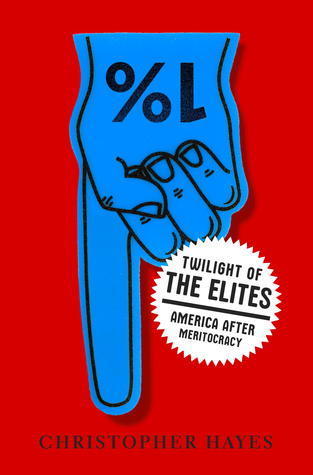 Twilight of the Elites: America After Meritocracy by Christopher Hayes is the selection for February for our Reading Liberally Book Club. (We meet monthly to discuss books on topics of interest to liberals and we’ve been doing this for a couple of years no, a not-particularly-sober complement to another group in town, Drinking Liberally.)
Twilight of the Elites: America After Meritocracy by Christopher Hayes is the selection for February for our Reading Liberally Book Club. (We meet monthly to discuss books on topics of interest to liberals and we’ve been doing this for a couple of years no, a not-particularly-sober complement to another group in town, Drinking Liberally.)
While I liked this book, I don’t think it does enough to prescribe a fix for our broken meritocracy. And it doesn’t do much to clarify what the term “Elites” really means, although part of the point is that it doesn’t really matter–the right-wing smear of liberal elitism misses the point, even if it rings a bell among disaffected conservatives. The fact is that Elites run both parties and are making it increasingly difficult for people to break into their ranks. People with money can get the best educations for their children and access to the best schools, and so testing has become a joke.
But where is this “twilight” Hayes refers to? I see no end to this domination by the wealthy. Unless we try to apply the term “elite” to those who have merit–but these days merit isn’t enough. On the other hand, Hayes also tries to make the case that the Elites are incompetent–citing some high profile failures–but that overlooks the successes.
How, then, do we really create opportunity for the rest of us? The book doesn’t offer much in the way of answers, unfortunately. Overall, I think it’s a muddled argument, dancing around some important issues.
February 22, 2013
2013 Reading: Shine Shine Shine by Lydia Netzer
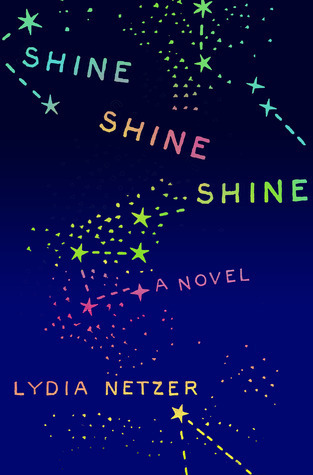 Shine Shine Shine by Lydia Netzer is one of a kind. That’s one of the things I look for in a book. Have I read this story before? It seems like we often read the same thing over and over again, but I never got that feeling with this book. And I enjoyed it from beginning to end, even if I didn’t fully understand the characters’ motivations. That’s okay; we often don’t understand our own motivation, much less other people’s.
Shine Shine Shine by Lydia Netzer is one of a kind. That’s one of the things I look for in a book. Have I read this story before? It seems like we often read the same thing over and over again, but I never got that feeling with this book. And I enjoyed it from beginning to end, even if I didn’t fully understand the characters’ motivations. That’s okay; we often don’t understand our own motivation, much less other people’s.
The main character, Sunny, is under a lot of stress, to put it mildly. Her husband, Maxon, a brilliant robotics engineer is in a rocket on his way to the moon. Her mother, Emma, who gave birth to Sunny under very difficult circumstances in Burma, is dying of cancer. Her son, Bubber, is autistic and is often a handful; Sunny is pregnant again, but not sure she’s fit to be a mother; and is confronted with her own medical condition, alopecia–never named in the book, but it’s a condition of hairlessness–when her wig flies off during a traffic accident. So you’ll forgive Sunny if she behaves somewhat badly.
Basically, all of those challenges are threads of the novel that make a satisfying whole as the reader learns the background of each and watches them get more or less resolved in the end of the novel. (More or less, I must emphasize.)
It’s no surprise that this book is being praised and was just named a finalist for the LA Times First Fiction Award. And I’m thrilled to say that I am on a panel with the author next month at the Virginia Festival of the Book. I’m looking forward to hearing her talk about her book.
February 20, 2013
Taking my own advice: Exploring Small Presses
 If you’ve ever finished a novel, you remember the euphoria of typing “The End,” even if you knew the next phase was going to be painful–revision. But eventually you finish the revisions, type “The End” again, and feel the euphoria once more.
If you’ve ever finished a novel, you remember the euphoria of typing “The End,” even if you knew the next phase was going to be painful–revision. But eventually you finish the revisions, type “The End” again, and feel the euphoria once more.
Then, unless you’re terribly impatient and have opted for self publishing without setting foot on a traditional publishing path, comes the demoralizing part: the hunt for an agent. No matter how professional and nice many agents are, it’s still a horrible process. It’s worse than dating was. All the girls are on the prowl for good-looking jocks, but you’re the homely smart kid who plays piano and reads philosophy and flunked P.E. Who can compete? (That was hypothetical, by the way. I don’t play piano.) Agents aren’t necessarily looking for smart books. They’re looking for brawny, fast books. I don’t blame them. Those books are no doubt easier to sell to publishers, because the publishers think that’s what the public wants. And probably most people do. But that’s not what all of us want.
So I finished this terrific novel. I was excited to test it on agents and sent out some queries. I sent out some more queries. Some agents were interested and a few made offers. Hooray! I signed with an agent and thought I had it made. And then that agent screwed me over. No other word for it. Unfortunately, it happens, and I just chose an agent who does that sort of thing. Back to the agent drawing board, but this time nothing happened.
You know what? I’m okay with that. It would be great to have an agent who can approach the big publishers on my behalf, but it looks like that’s not going to happen. And as a result I am reminded that there is a big publishing world out there. Lots and lots of very exciting small presses are publishing terrific books every day. They aren’t hard to find. Look on your own bookshelves or go to a store and look on their shelves. And look at a wonderful site like New Pages, or pay to access the list at Duotrope. That’s what I’m doing. And I’m determined to find a match for this book. Because I think it’s a smart one.
February 18, 2013
The New Yorker: “The Furies” by Paul Theroux
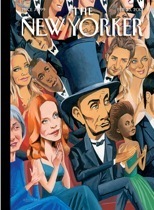 February 25, 2013: “The Furies” by Paul Theroux
February 25, 2013: “The Furies” by Paul Theroux
Having just read a pair of novellas by Theroux (“Dr. Slaughter” and “Dr. DeMarr,” published together under the title Half Moon Street), I was expecting good things from this story. After reading “The Furies,” though, I was disappointed because I found the main character so revolting. On reflection, though, the main characters of both of those novellas are pretty revolting, too, so in a way this story is of a piece with them.
Still, I didn’t much enjoy it. Ray Testa is a dentist who leaves his wife for his young office hygienist. He’s not too upset about and neither is the wife, and neither is the hygienist, whom Testa proceeds to marry. He takes her to his 40th High School reunion, which is a big mistake. He runs into several old girlfriends who recount how disgusting he was back then, and one of these women is in touch with the ex-wife, so she’s particularly offended by the new wife’s presence. After that weekend they go home and more women appear, revealing various examples of Testa’s bad behavior. The young wife finally gives up on the marriage, and tells Testa that he’s just like these old women who are angry with him. He looks in the mirror and realizes she’s right.
One thing noticeable in the story is that all the old women are grotesque; none has aged well. Theroux is asked this question in the Q&A with Paul Theroux and his answer is that they are the Furies and so must be grotesque. (It does seem to suggest that all women age this way, though, so I imagine he’ll take some grief for this.) And Theroux sees Testa as more victim than anything else, but I don’t see it that way. His behavior with these women from high school and college and beyond was bad. There’s no getting around it. And he’s paying the price for that now, so the story is somewhat satisfying (if transparent) for that. But he’s no victim.
February 16, 2013
Short Story Resurgence?
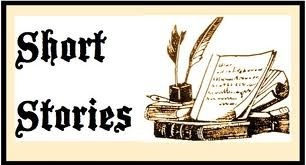 We are now being told that short story collections are all the rage. A story from yesterday’s New York Times is circulating among writers on Facebook today that argues short story collections are undergoing a resurgence–thanks to the Internet (Good Fit for Today’s Little Screens: Short Stories.)
We are now being told that short story collections are all the rage. A story from yesterday’s New York Times is circulating among writers on Facebook today that argues short story collections are undergoing a resurgence–thanks to the Internet (Good Fit for Today’s Little Screens: Short Stories.)
Story collections, an often underappreciated literary cousin of novels, are experiencing a resurgence, driven by a proliferation of digital options that offer not only new creative opportunities but exposure and revenue as well.
The author, Leslie Kaufman, cites 2013 releases by such notables as George Saunders, Karen Russell, Amber Dermont, and Jess Walter as evidence of … something. Kaufman also quotes Cal Morgan of Harper Perennial: “The Internet has made people a lot more open to reading story forms that are different from the novel, and you see a generation of writers very engaged in experimentation.”
I don’t know about that Internet claim, but those of us who were paying attention already knew great things were happening with the short story. Consider the Story Prize. Take a look at the blog posts by authors who were nominated for this coveted award in 2012: Index of Blog Posts. The list of 2012 story collections is mind-boggling, including some really terrific books by both established and emerging writers.
For years, short story writers have been told by agents that story collections don’t sell. Readers don’t buy them (except, presumably, for other writers of stories), so publishers don’t publish them, so agents won’t represent them. No writer I know was ever convinced by this argument, but there wasn’t much we could do about. Agents were/are the gatekeepers to the big publishers, and so there was cycle that fed on itself.
Fortunately, though, there are some small presses that produce some excellent short story collections. Press 53, for example, which published both of my collections, specializes in story and poetry collections. I’m hopeful that, if it’s true about the story collection resurgence, that readers look for titles beyond the big publishers.
February 15, 2013
2013 Reading: Half-Moon Street by Paul Theroux
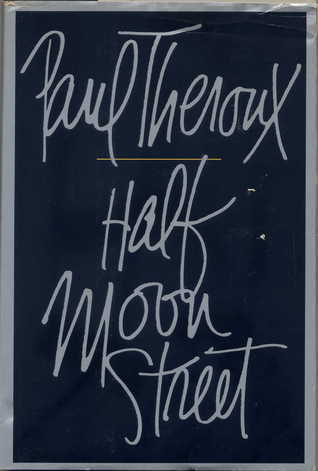 Half Moon Street: Two Short Novels by Paul Theroux was an enjoyable read. (Or listen, actually, as I heard the book in the car.) I’m not a fan of Theroux’s non-fiction travel narratives–he’s insufferably arrogant in those books–but I usually like his fiction. This is no exception.
Half Moon Street: Two Short Novels by Paul Theroux was an enjoyable read. (Or listen, actually, as I heard the book in the car.) I’m not a fan of Theroux’s non-fiction travel narratives–he’s insufferably arrogant in those books–but I usually like his fiction. This is no exception.
First up is “Dr. Slaughter,” a novella about PhD in Political Economy who is on a fellowship at an Institute in London. Her field is China, but because her recently ended marriage was to a China specialist, she switches her studies to the Middle East. She’s voracious when it comes to men, and so when the opportunity to work in an escort agency comes to her, she grabs it. And things then get really interesting. The character of Lauren Slaughter is fascinating and the dialogue spot-on.
The second novella is O. Henry-ish. “Dr. DeMarr” is about Gerald and George DeMarr, a set of twins who are estranged after their father dies because he was the one who insisted on their close ties. After many years, George returns to see Gerald, but it doesn’t go well.
I much preferred the first of the two novella’s, but that might have been because of the reader. “Dr. Slaughter” is set in London and so it seems right that it is read by an English woman, even though the protagonist of the story is American. It gives the book a flair that is missing in the second one.
February 14, 2013
2013 Reading: Windows 8 for Dummies by Andy Rathbone
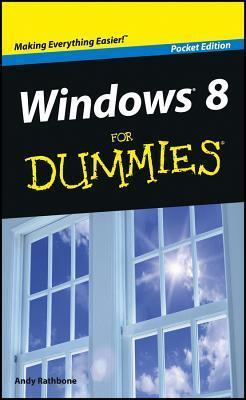 I feel a little silly including this book in a blog of my reading for the year, but, hey, it’s a book, I read it, and someone might care. I picked up Windows 8 For Dummies because I recently got a new computer and it runs Windows 8, which is completely different from previous Windows operating systems. The folks at Staples offer a tutorial on Windows 8, but I didn’t find it terribly helpful. So I got the pocket edition of this guide, just to get me started, figuring I’d learn most of the rest of what I needed simply by exploring on my own. Which is how I’ve learned every other version of Windows I have used, which is most of them.
I feel a little silly including this book in a blog of my reading for the year, but, hey, it’s a book, I read it, and someone might care. I picked up Windows 8 For Dummies because I recently got a new computer and it runs Windows 8, which is completely different from previous Windows operating systems. The folks at Staples offer a tutorial on Windows 8, but I didn’t find it terribly helpful. So I got the pocket edition of this guide, just to get me started, figuring I’d learn most of the rest of what I needed simply by exploring on my own. Which is how I’ve learned every other version of Windows I have used, which is most of them.
But Windows 8 is different, and it almost doesn’t make sense on a PC. It’s designed for a touch screen environment–the new generation of computers and tablets. I’m not there yet, however, so the “app-based” OS is mostly a novelty. For most purposes, the new Start Screen–which is where all the “apps” reside–is just another version of the traditional Desktop, except that there’s also a Desktop, exactly like the old Desktop, hidden underneath.
Most of this book wasn’t of much use, but it does have some good secrets that I hadn’t yet discovered on my own, like “snapping” apps to the Desktop (a keyboard method of showing both an app (the calendar, for example) and a program operating in a Window (Word, for example) at the same time. That’s handy to know. But truly, there wasn’t much more than that.
Note that this is the pocket edition, however. There are several other editions, and I suppose it’s possible that one of them is more helpful than this one is.
February 13, 2013
2013 Reading: The Ones We Have by Leah Naomi Green
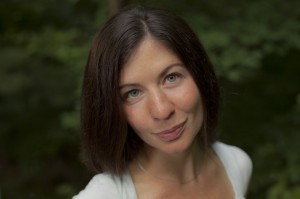 I had the great pleasure on Sunday night to be part of a reading in the city of Roanoke called the One Night Standing Reading Series. The series takes place in some funky space called the Kirk Avenue Music Hall and is nearly ideal for this sort of thing–a good sound system, room for about 40 people seated in rows, plus some room to mingle before, during intermission, and after. In addition to me, there were two other readers. The first was Ralph Berrier Jr., a journalist, read some of this columns from the Roanoke Times, and also read from his novel about his bluegrass-playing grandfather and great uncle. The book is called If Trouble Don’t Kill Me: A Family’s Story of Brotherhood, War, and Bluegrass and Ralph, also a musician, accompanied himself on fiddle. I’m looking forward to reading his book.
I had the great pleasure on Sunday night to be part of a reading in the city of Roanoke called the One Night Standing Reading Series. The series takes place in some funky space called the Kirk Avenue Music Hall and is nearly ideal for this sort of thing–a good sound system, room for about 40 people seated in rows, plus some room to mingle before, during intermission, and after. In addition to me, there were two other readers. The first was Ralph Berrier Jr., a journalist, read some of this columns from the Roanoke Times, and also read from his novel about his bluegrass-playing grandfather and great uncle. The book is called If Trouble Don’t Kill Me: A Family’s Story of Brotherhood, War, and Bluegrass and Ralph, also a musician, accompanied himself on fiddle. I’m looking forward to reading his book.
I read after Ralph–no fiddle for me, but the audience seemed to enjoy my reading of the first half of “The Replacement Wife” from What the Zhang Boys Know, and then we moved on to poetry. The last reader of the night was Leah Naomi Green, who read from her Flying Trout Press Chapbook, The Ones We Have. And I’m writing about it here because it’s short and I read the whole thing Monday evening. It’s really delightful work that is partly about the author’s experiences in the Dominican Republic and partly about her own family, although it occurs to me that there are characters who could be at home in either setting.
Here’s just one small piece, from the poem “Kaddish” –
My father had grass in his pockets
at my cousin’s bar mitzvah,
torn from the ground
near his father’s grave and brought with,
his own flesh, formed from flesh, not symbol enough.
I don’t see the book on Amazon.com yet, but you can probably order it from Flying Trout Press.
February 12, 2013
2013 Reading: Scrapped by Mollie Cox Bryan
 I’m not a reader of mysteries, honestly. I’ve been reading some now and then to see what I can learn from them about plot, but that’s not why I read Scrapped (Cumberland Creek Mysteries) and its predecessor in the series, Scrapbook of Secrets (Cumberland Creek Mystery 1). These I read because their author, Mollie Cox Bryan is a friend and one of the best known writers in my county (known primarily for a couple of cookbooks based on a local restaurant that is something of an institution: Mrs. Rowe’s Restaurant Cookbook: A Lifetime of Recipes from the Shenandoah Valley and Mrs. Rowe’s Little Book of Southern Pies).
I’m not a reader of mysteries, honestly. I’ve been reading some now and then to see what I can learn from them about plot, but that’s not why I read Scrapped (Cumberland Creek Mysteries) and its predecessor in the series, Scrapbook of Secrets (Cumberland Creek Mystery 1). These I read because their author, Mollie Cox Bryan is a friend and one of the best known writers in my county (known primarily for a couple of cookbooks based on a local restaurant that is something of an institution: Mrs. Rowe’s Restaurant Cookbook: A Lifetime of Recipes from the Shenandoah Valley and Mrs. Rowe’s Little Book of Southern Pies).
But back to the mysteries. These aren’t thrillers; they aren’t procedurals; they aren’t detective stories. They’re cozies–pleasant, light reads about crimes that are solved by female amateur sleuths. So if you’re not into cozies, these books probably aren’t going to be your cup of tea. In this case, the amateur sleuths are a group of scrapbookers in a small town at the edge of the Blue Ridge Mountains, and so these books might just appeal to you if you’re into that sort of thing. The other reason I read the books, though, is that the author and I are on a panel together next month at the Virginia Festival of the Book the subject of which is “Ties that Bind: Family in Fiction.” And that’s where anyone might find something to admire in these books.
That’s because the family relationships are intriguing and universal. Mike and Annie, a recently arrived couple with two sons; Vera and Bill, recently divorced because of Bill’s infidelity; Vera’s mother and her late husband, who appears to her from time to time as a ghost; Sheila, the scrapbooking queen, and various other friends, policemen, and other extras who help move the plot along. Some of it’s fun, some of it’s a bit racy (which apparently offends the true cozy fan), and some of it borders on the implausible.
But these are fast reads, and entertaining. If you like that sort of thing.
February 11, 2013
Meet Seth Michelson . . . and learn how to get his book for free
 I’m happy today to present a conversation with Seth Michelson, author of poetry collection Eyes Like Broken Windows. And if you read to the end, you’ll see there’s an opportunity to get his book . . . for FREE!
I’m happy today to present a conversation with Seth Michelson, author of poetry collection Eyes Like Broken Windows. And if you read to the end, you’ll see there’s an opportunity to get his book . . . for FREE!
Welcome, Seth. Thank you for being here. Why don’t you tell us a little about yourself to get this started?
Well, thank you, Cliff. It’s a pleasure to be here to e-meet your readers (Hi, everyone!) and to converse with you.
But before talking about myself, I’d like to mention briefly what a fine writer you are, Cliff. Your newest book, What the Zhang Boys Know, is a great read. Its characters face disease, child loss, absent parents, and more, and through their travails, they teach us about endurance, about how to persist and to do so with compassion and joy. In other words, I admire your ability to render so artfully the anguish of interpersonal experience. It’s one of the reasons why I’m delighted to be here talking with you about writing.
As for me, I’ll say that I’m a poet, which simply means that I insatiably read and regularly write poems, and my newest book is Eyes Like Broken Windows. I’d like to add, too, that judging by public reactions (e.g. at readings, in book reviews, in fan emails), people really seem to be enjoying the book, for which I’m very grateful. I feel very fortunate that so many people are not only reading my book but taking the time from their busy lives to tell me about it.
I think one of the reasons why people are responding well to your book is that it’s an exciting book to read. It’s filled with a diversity of places, people, emotions, and poetic forms, ranging from sonnets to free verse. I’ve also noticed that you sometimes use both Spanish and English in there. Would you talk a little about that?
Sure, as a poet I’m very interested in the limits of language. In a complementary way, I’m interested, too, in challenging perfunctory social and cultural constraints. In my writing, I therefore like to identify and rethink my habits of being, including how I read, reflect, and write. Of course none of this emerges, or at least not in fully formed ways, when I sit down to begin to write. Rather, it emerges allusively, coyly, through a wisp of feeling, a captivating sound, a striking image glimpsed or imagined that jump-starts a new poem. From there, that tidbit grows into a poem through an exploratory process that creates itself through each act of writing. And for me, over the past few years (or longer…), this often includes a skittering along the vaporous border between English and Spanish within a poem, where I hope to hew alternative zones or pockets of experience, interlingual discursive spaces, within which a hybrid language emerges and asserts itself to inflect forms of being. In a sense, it’s one more way that a poet can inundate the reader with possibilities.
Could you give us an example of this?
Sure, in the central third of Eyes Like Broken Windows, I have a heroic crown of sonnets about a transnational, transhistorical network of experiences. As your readers know, a heroic crown of sonnets comprises fifteen sonnets sequentially linked into a circular cycle. I use that form to test the necessity of boundaries, both in life and in poetry, and I use the form, too, to weave together three narrative threads: my time living with a war criminal in Argentina from the genocide there (1976-83), my wife’s emigration from Argentina to the US during that era, and the story of a nineteen-year-old Argentine girl murdered by that war criminal. And as you noticed, the crown is bilingual at points, importing voices and vernaculars specific to moments in those interwoven stories. Nevertheless I think monolingual-English readers can understand it all contextually and via cognates. Plus I’ve included a glossary at the end of the book. And readers seem to really enjoy the crown. It’s an intrinsically fascinating form.
Tangentially, I’d like to mention, too, that the politics of bilingual poetry, and especially of the typography and formatting of bilingual books, fascinate me. And while I sympathize with positions against italicizing Spanish and adding glossaries, I do so in the crown because part of its intent is to offer a transcultural historiography: I hope for it to offer its U.S. monolingual-English audience something of importance about the period of the genocide in Argentine history, which is of course linked to U.S. history in particular and to postwar hemispheric and geo-politics in general. So my crown tries in small, poetic gestures to join those overlapping local and global discussions about how to live in the aftermath of extreme violence.
Interesting. Can I ask a quick question about nomenclature? I heard you refer to that period in Argentina as a “genocide,” which is new to me. I’d always heard it referred to as “The Dirty War.” Am I confusing two periods?
No, Cliff. You’re correct, and it’s a very good question. Both terms are used in reference to the dictatorship in Argentina from 1976-83. I prefer to use the term “genocide” as I find “Dirty War” a misnomer. There was no “war.” The military overthrew the democratic government, targeted civilians as enemies, and systematically murdered them. The symbolic civilian death toll from the period is 30,000. The military justified the torture and murder of these victims as being part of a necessary, if unusual, internal “war.” I, like many, see it instead as the fascistic slaughter of targeted categories of people, as genocide.
It’s a powerful subject, Seth. I noticed that you’ve also set some of your poetry about it to music, which I listened to on your website. Would you tell us about that?
Happily! I love music. I even fantasize about being a cellist [laughing]. So it was a very special experience for me to collaborate with the superb Chinese composer Zhou Tian. We set the first sonnet of the crown to operatic music for soprano, cello, and piano, and, as you mentioned, people can listen to it on my website, sethmichelson.com. Tian is a precociously masterful young composer, and our joint effort won First Prize at the 2009 ASCAP Art Songs Competition. More importantly, the piece has elicited powerful, positive responses from survivors of the Argentine genocide. It means a lot to me that it means a lot to them. These are people who’ve suffered severely—imprisonment, torture, the murder of friends and family—so it’s deeply gratifying and humbling to be able to help them with their pain in some small way.
I can imagine. In my experience, I’ve been very moved by hearing from readers of the Zhang Boys, for instance, about their life experiences in relation to the book. And speaking of readers, what are some books you’ve read recently and might recommend to us?
Well, on my way to the airport in Boston a couple of weeks ago for a flight home to LA, I picked up a copy of Don DeLillo’s novella The Body Artist, which is really idiosyncratic within his larger literary project. And I really enjoyed it (though a novella is too short for a five-hour flight; stupid oversight in book selection on my part! [laughing]).
I also am enamored with Catherine Malabou’s newest book in English, The New Wounded: From Neurosis to Brain Damage. Not only is it highly informative, but it’s iconoclastic in its analysis of neuroscience, brain trauma, and identity.
I’m also gearing up to teach poetry workshops starting next week in Los Angeles and then over the summer in New York, so I have teetering piles of books of poetry on my desk and floor, from which I’m distilling recommendations for my students, so feel free to check back with me about that (I can be reached easily through my website, about this or any matter).
Speaking of “other matters,” what are some of your hobbies? What do you enjoy doing besides reading and writing?
Well, I love to cook, so I spend a lot of time in the kitchen. I also always welcome recipes from others. So if you’re sitting on a good one, Cliff, then please consider sharing it with me. The same goes for all of you reading this. Send me recipes, please!
Do you ever write about food? Does cooking influence your poetry writing?
It does! In Eyes Like Broken Windows, for example, food appears often.
If you’ll permit it, here’s a related poem about those crucial instruments of eating, the teeth.
My Teeth In The Mirror
Smog-stained, coffee-stained, burnt
by digestive enzymes, they rim my mouth
like a harbor’s yellowed palings, stand
guard at the hideout’s door, gate-like
they open for the edible, divide like fences
my stench from New York’s. Plus how tenderly
they clasp nipples and lips in the dark!
O enameled, stalwart lovebuckles!
O speed bumps between my voice and the world!
Bear this corrosion until you’re withered
and your center’s deeply sore, then make me
believe in your cavities as metaphor:
That all the holes in a life
can be polished, filled with silver,
and, if rootless, dressed in layers of gold.
Great poem, Seth. Thank you. And thank you for this interview.
Thank you, Cliff. I’ve enjoyed this, and I hope that your readers do, too.
By way of thanks, I’d also like to make a special offer here to your readers: I’ll give away a free copy of my book (free!) to anyone who orders your book, What the Zhang Boys Know, before March 15. Take advantage, people! [Laughing...]
Thanks again, Cliff, and thanks to all of you out there for reading this.
Okay, readers, you heard the man. Anyone who orders a copy of my book, What the Zhang Boys Know, before March 15, either directly from me, or from Press 53, will ALSO get, absolutely free, a copy of Eyes Like Broken Windows. What a great deal. Thank you to Seth and Press 53 for their generosity.



